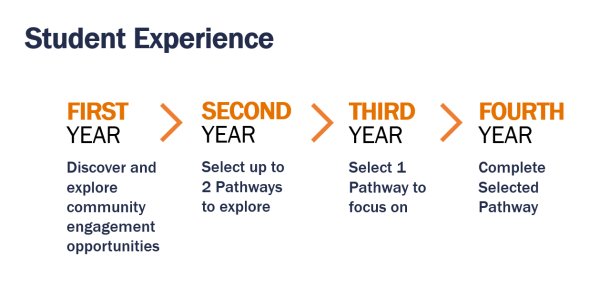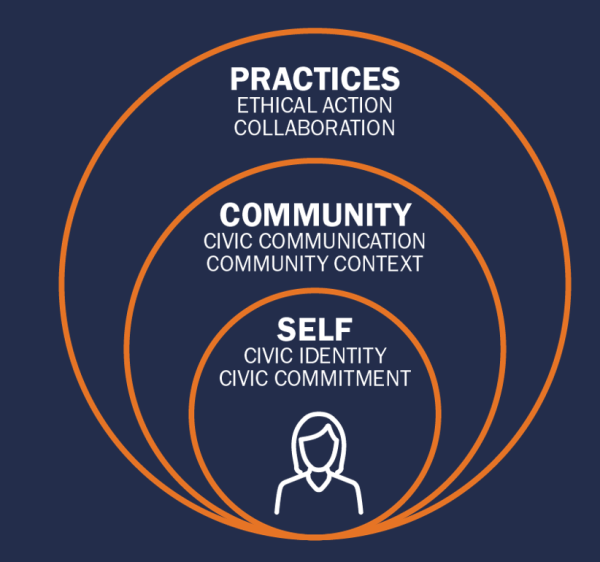Expectations
Reflection:
Each semester after the first year you will be required to submit a written reflection. To do this you must enroll in UNST 1993 - Public Service Pathways Program, a non-credit course used to submit the reflection each semester and interact with a faculty/staff reflection reader.
Course:
Your second year you will be expected to take a one-credit course: UNST 1410: Democracy and Public Service. This course defines public service and introduces practices that support impactful service. Through speakers, readings, and reflection, students will begin to define their mission, recognize the power of collaboration, evaluate their strengths, and learn from challenges. Students will understand how personal rights and responsibilities of all combine to sustain democracy.
Checklists
Each year you are in the program, you will be provided with a checklist, which will act as a curated guide of events aligned with our core competencies and the seven pathways. The checklists are meant to be used to identify the opportunities that will help you choose your pathway. The components of the checklists fall under the following categories.
Connect:
Meet other service and/or civic-oriented students; build communities around shared interests.
Learn:
Learn from faculty, community experts, staff, and others about public service and areas of service interest (your chosen pathway).
Serve:
Volunteering, service-learning, community-engaged initiatives, etc.
Plan:
Career visioning and preparation; networking with alumni and events.
What are the Competencies?
The Public Service Pathways program has been built on a set of competencies that function as a baseline for developing a public service mindset across the different pathways. They are meant to help you reflect on your own values, formulate an understanding of your context and societal systems, and develop your own skills and approach to public service and community engagement.
Civic Identity
Civic identity is the way we understand ourselves as members of society. This begins with a strong understanding of the many facets of our identity (e.g. cultural, ethnic, racial, political, and religious etc.) and our sense of responsibility towards others.
Civic Commitment
Civic commitment is the ongoing development and reflection of our purpose and responsibility for making our communities better places. It requires us to develop empathy, humility, and appreciation for different perspectives as we make connections between our experiences in communities and classrooms.
Community Context
Every place and community is a unique landscape of contexts and people. Different communities have been home to various movements and changemakers; local, national, and global histories; communities of individuals defined by shared identity, and differing visions of community well-being. Successful community engagement requires acknowledging these systemic forces, understanding places, knowing histories, and respecting community leaders and knowledge-holders.
Civic Communication
Civic communication allows us to establish relationships, build trust, and further civic action. Generous listening, clearly expressing our ideas, and meaningfully incorporating other perspectives requires practice.
Ethical Action
Ethical action is the integration of rigor and empathy to respond to ethical dilemmas. It requires us to identify and understand our own beliefs and values, be guided by empathy to think about how different perspectives might be applied, and develop a response to the dilemma.
Collaboration
Collaboration occurs when we work with others toward a shared goal taking time to build authentic relationships, sharing responsibility, seeking diverse viewpoints, reflecting on our own interactions, and leveraging each team member’s unique talents and insights.
Year 1
Connect
- Public Service Pathways Orientation
- Community Engagement 101 Workshop: Embracing a Service Mindset
Learn
- Designated lecture
- Charlottesville community lecture
- Pathways Newsletter designated Learn event
(Participate in 2)
Serve
- Madison House event
- Explore a service-related student organization
- UVA or Charlottesville community volunteer day
(Participate in 1)
Plan
- Complete PathwayU - UVA Career Center's Identity & Values Assessment
- Create a Handshake account
Reflect
- Track and reflect on your experiences in Hoos Involved.
Year 2
Connect
- Public Service Pathways Orientation (if not completed in Y1)
- Community Engagement 101 Workshop: Embracing a Service Mindset (if not completed in Y1)
- Pathway-specific student social
Learn
- Enroll in and complete the one-credit course: UNST 1410 - Democracy and Public Service (taken in either fall or spring semester)
- Pathway-specific Newsletter designated Learn event
Serve
- Extractive Service Workshop: Ethical Approaches to Community Engagement
- Join and commit to a Madison House program or service-related student organization
- Take a UVA Community Engaged Service-Learning Course
(Participate in 1)
Plan
- Through guest lectures in the UNST Democracy and Public Service - develop an understanding of the world of work within each of the 7 pathways
- Attend a Career Center Career Community Drop-In
Reflect
- Complete a reflection at the end of each semester and respond to feedback from your reflection reader. Identify an action step from the feedback.

